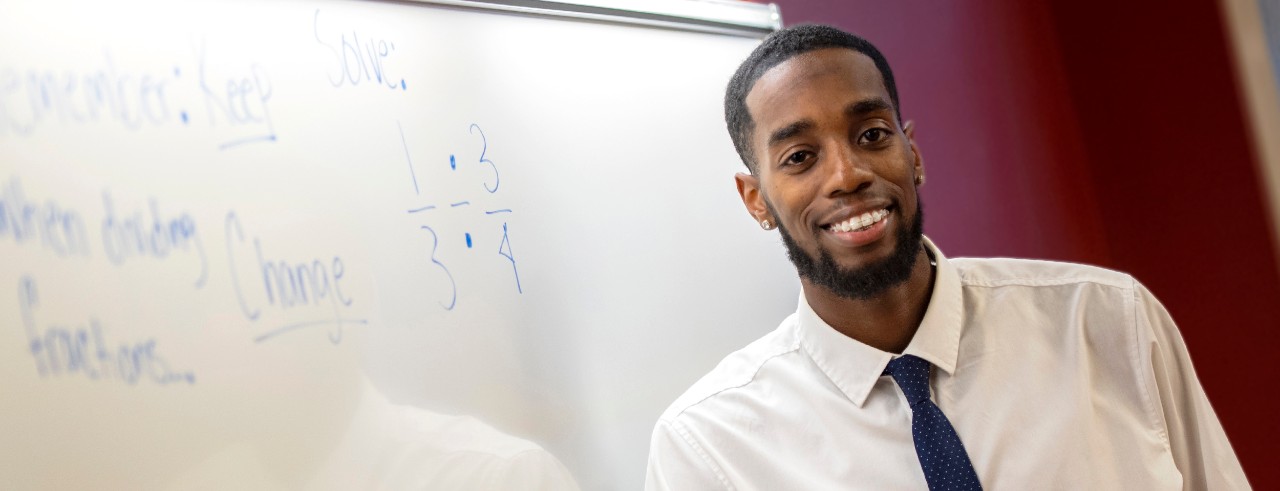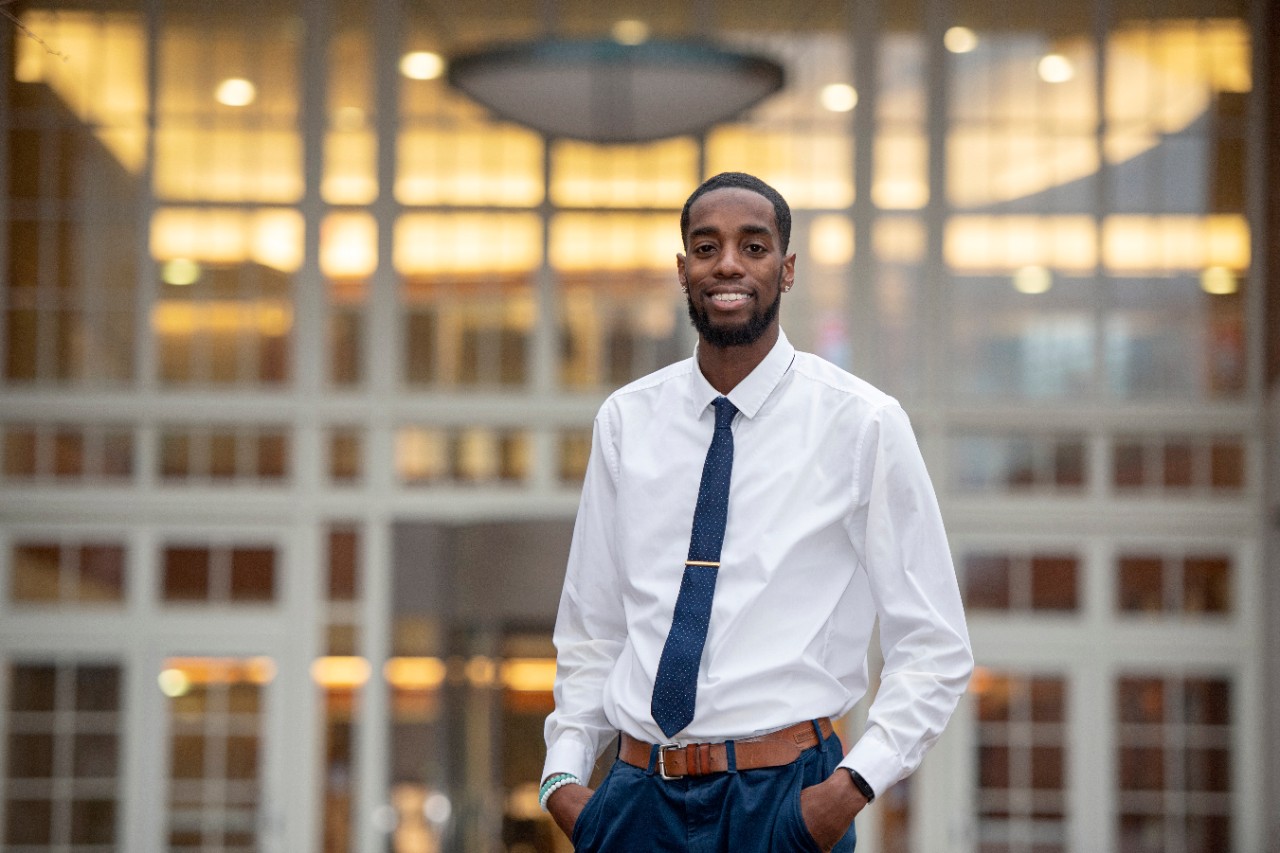
Engineering alum sees K-12 educators as the path to STEM diversity
NLign Analytics, Etegent Technologies, and UC support future teachers
Keonte Alexander, CECH ’22, is accustomed to mentoring and caring for others. He’s a father and a science and math teacher at William Howard Taft Elementary School in Cincinnati Public Schools. He became interested in serving youth while earning his associate degree at Cincinnati State and working at the Boys and Girls Club of Greater Cincinnati.
A tour of the University of Cincinnati’s campus with Club teens piqued his interest.
“I wanted to be a teacher because I realized the need for Black male teachers was there,” he says. “Being around students and seeing that they needed help made me change my major from sports administration.”
After transferring to UC, Alexander began pursuing his education degree at the College of Education, Criminal Justice, and Human Services (CECH). As a first-generation student, he became a part of the Gen-1 Program, allowing him to live on campus for two years.
Balancing parenting, studying, work and student-teaching was challenging and expensive.
“Paying for my Ohio Assessment Educator (OAE) exams was a barrier because I’m a father, and I have to take care of my kids,” he shares. “It was hard to even get by with the most simple things. A $100 for those exams was a lot.”
McKinley Estime, associate director of equity and justice at CECH, says Alexander’s struggles are not unusual. Student teachers don’t receive compensation for their required time in the classroom. Plus, there is a list of fees for exams and licensure, background checks, tutoring, textbooks and software.
Eliminating barriers and building the future
Estime and his colleagues now have the capacity to identify and help eliminate barriers for students like Alexander, thanks in large part to a $100,000 gift from Tom Sharp, CEAS ’84, MS ’92, PhD ’97, and the teams of NLign Analytics and Etegent Technologies. The Inclusive Excellence Support Fund for Students in Math and Science aims to recruit, train and develop students who have expressed an interest in teaching in urban school districts with a preference for those in the UC Chapter of Minority Association for Future Educators (MAFE).

Keonte Alexander, CECH ’22
How did an engineering graduate become passionate about helping educators? Since childhood, Sharp has always liked building and creating. He is also intentional about helping others. As the founder of two engineering companies, NLign Analytics, he noticed the need for software engineers and a lack of diversity.
Wanting to make an impact, Sharp decided to build something that could institute change. After discussing his ideas with fellow friends and science teachers, he devised a plan and reached out to his alma mater.
“We decided to focus on growing the science teacher pipeline, ideally minority students, so they can go out into school systems and provide a role model for someone that looks like them,” he says. “One teacher can impact thousands of students. Our role has been removing the barriers that happen.”
He hopes that teachers like Alexander spark their students’ interest in science and math, exposing them to the STEM field.
One teacher can impact thousands of students. Our role has been removing the barriers that happen.
Tom Sharp CEAS ’84, MS ’92, PhD ’97
The fund has impacted 50 students by supporting tutoring services, test vouchers, emergency support, direct tuition payments and programmatic support for MAFE.
“We are incredibly thankful for Mr. Sharp,” says Estime. “He’s a great example of someone using his education and career to make an impact.”
Alexander agrees. He says assistance from the fund paid exam fees and other bills preventing him from obtaining his transcripts.
“A $100 may not be a lot, but it is when it comes to graduating on time or allowing you to take exams to get your credentials. If it wasn’t for the help, I wouldn’t be teaching in Cincinnati.”
Alexander adds that many of his sixth-grade students have told him that he is their first male teacher.
“I have a good bunch of great, smart kids,” he says. “I want to thank Mr. Sharp from the bottom of my heart. I owe him a lot of gratitude.”
Feature image at top: Keonte Alexander, CECH '22. Photo: Colleen Kelley for the UC Foundation.
Support the Inclusive Excellence Support Fund for Students in Math and Science
Contact Chris Eden at edenca@foundation.uc.edu or Alina Nosal at nosalaa@foundation.uc.edu.
Next Now
With its focus on innovation and impact, Next, Now: The Campaign for Cincinnati is where ambition meets action. At the University of Cincinnati and UC Health, we’re driven by next; thinking bolder and dreaming bigger to create the tomorrow we envision, today. Learn more at nextnow.uc.edu.
Related Stories
Engineering alum sees K-12 educators as the path to STEM diversity
January 4, 2023
Keonte Alexander, CECH ’22, is accustomed to mentoring and caring for others. He’s a father and a science and math teacher at William Howard Taft Elementary School in Cincinnati Public Schools. He became interested in serving youth while earning his associate degree at Cincinnati State and working at the Boys and Girls Club of Greater Cincinnati. A tour of the University of Cincinnati’s campus with Club teens piqued his interest.
Uplifting stories help #UCtheGood
July 16, 2020
UC Marketing + Communications gathers recent uplifting stories to help the community focus on the good during coronavirus pandemic.
President Pinto's 2021 year-in-review message
December 17, 2021
University of Cincinnati President Neville G. Pinto looks back on a historic year that brought students, faculty, staff and the community back together like never before.
